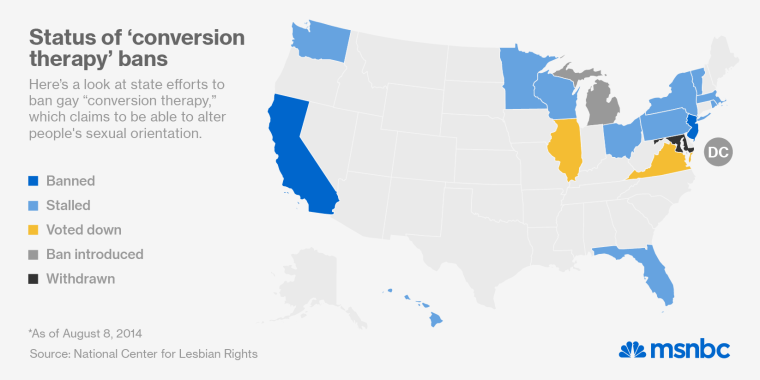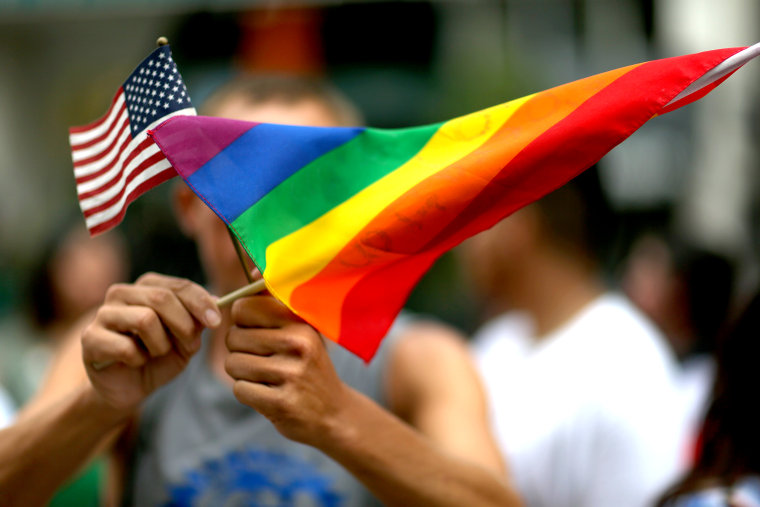Gay and lesbian rights activists are racking up court victories around the country on the issue of same-sex marriage, but their efforts to ban the discredited practice of "conversion therapy" for minors have stalled in the two years since California became the first state to do so.
"I would not say we're having a hard time, on the contrary all of these efforts are coming to the forefront, and I would say they're very revealing of the quackery that goes on," said David Dinielli, regional director for the Southern Poverty Law Center, which is suing the group JONAH for fraud over its claims that it can change a person's sexual orientation. "Lots of things take more than one attempt, and we're certain that the next set of legislative sessions there will be some successes."
California first banned conversion therapy, sometimes known as "ex-gay" therapy, for minors in 2012; New Jersey followed suit in 2013. That New Jersey's ban was signed by Republican Governor Chris Christie, an opponent of same-sex marriage rights, was seen by LGBT rights activists as a sign of bipartisan support for banning the once-popular practice. Since then, however, efforts in more than a dozen states have been stalled or blocked, including in blue states like New York and Illinois. The Texas Republican Party adopted a pro-conversion therapy plank in its policy platform. The Christian Post suggested the failure of the bans was the result of "ex-gays showing up and testifying" about their ability to change their sexual orientation.
"The education campaign is only a couple of years old, people who don't understand the full depth of the harm it causes, might not want to ban it if one or two people tell them it would work," said Dinielli. "The fact that there have been so many attempts suggest there is in fact movement."
Mainstream medical organizations warn against conversion therapy, which once employed methods like electric shock, inducing nausea, hypnosis, and even castration to banish unwanted same-sex attractions. In 2012, the World Health Organization stated that "services that purport to 'cure' people with non-heterosexual sexual orientation lack medical justification and represent a serious threat to the health and well-being of affected people." Conversion therapy's main expert apologist, psychiatrist Robert L. Spitzer, recently recanted and expressed regret for work he produced suggesting that people could alter their sexual orientation.
For many, the damage had already been done. Judge Vaughn Walker, the California federal judge who first overturned California's Proposition 8 ban on same-sex marriage, has recalled going to a therapist to be "cured" of his sexual orientation. Shannon Minter, legal director for the National Center for Lesbian Rights, recalls working with gay and lesbian runaways two decades ago, many of whom Minter said had fled efforts to force them to change their sexual orientation.
"It made a permanent impression on me, how damaged these young people were, several of them ended up taking their own lives. Since then I have just been absolutely determined to find someway to stop this," said Minter. "The only groups opposing these laws are these anti-LGBT therapy groups who think being gay is wrong and want to be able to engage in these practices."
Fortunately for LGBT rights activists, the Supreme Court gave its tacit blessing to state bans on conversion therapy for minors last year, when it refused to take a case challenging California's ban. Groups that favor conversion therapy argued that the ban violated their First Amendment rights.
"The debate is turning into one where the people who want to sell this are playing the victim card. They are saying they are being discriminated against," said Dinielli. "This is not a political issue, this is about the lives, health and safety of young people. There are things we all know doctors shouldn't do to people, this is one of them."
Despite the fact that the right-leaning Supreme Court has been sympathetic to free speech complaints, particularly from conservative religious plaintiffs, the high court let stand the ruling that the ban “regulates professional conduct, not speech.”
That means if the bans can get passed, there's good reason to believe they'll stay in place.
"This is an issue we see people rally around to a degree we don't often see," said Minter. "I think these bills are doing remarkably well, and I think this year we'll see at least another handful pass."

